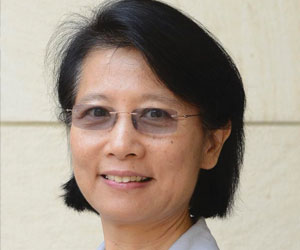
Why Pursue a Master's Degree in Advanced Materials Engineering
- Interdisciplinary curriculum (taking courses from Materials Engineering, Management of Technology, Electrical and Computer Engineering, Bio-Engineering, and other science and engineering disciplines across departmental boundaries).
- State-of-the-art technical knowledge and skill training
- Internship and Fellowship opportunities
- Pathways to Doctoral Programs and leadership job opportunities in Materials Science and Engineering
Graduates will have advanced knowledge and capability to solve problems related to the synthesis, characterization, design, and application of materials. Graduates choosing biomedical material concentration will also be a job-ready workforce for the continued growth of biotechnology.
Knowledge Areas
The program addresses three interlinked areas of knowledge in advanced materials engineering:
- Structure-function relationships in materials, which determine behavior at the macro-, micro-, nano-, molecular- and atomic-levels;
- Synthesis, characterization, measurement, and computational modeling of materials (ceramics, composites, metals, polymers, multifunctional, electronic and biomedical) especially those with novel multifunctional properties; and
- Design and fabrication of advanced materials and devices that address current and future technological challenges in a wide range of applications including energy, communications, control and automation, health and medicine, nanotechnology, structural and environmental, and transportation.
Concentrations
Each student will choose one of the concentrations according to materials classifications and applications tailored to his or her specialties. Interwoven in the two concentrations will be concepts of computational modeling that develops new materials with novel properties and responses for targeted applications.
- Multifunctional Electronic, Dielectric, Photonic and Magnetic Materials
- Multifunctional Biomedical Materials
- Semiconductor Materials and Manufacturing
Admission & Application Requirements
Applications are submitted through the UTSA Graduate Application. Please upload all required documents (listed below) on your UTSA Graduate Application. It is the applicant’s responsibility to ensure completion and submission of the application, a nonrefundable application fee, and all required supporting documents are on file with UTSA by the appropriate application deadline.
| Advanced Materials Engineering (MS-MatE) | ||
|---|---|---|
| Required Degree | Bachelor's Degree from an accredited college or university in the United States or have proof of equivalent training at a foreign institution. | |
| Minimum GPA | 3.0 (on a 4.0 scale) Departments may consider GPA of last 60 semester credit hours | |
| Coursework | 18 credit hours in an area related to this graduate degree and at least 12 hours must be at the upper-division level. | |
| Transcripts* | Required from all institutions attended; international transcripts must be recorded/translated to English | |
| Credential Evaluation | Required if you have earned university-level credit from foreign institutions. Submit an evaluation of your transcripts from Educational Credential Evaluators (ECE) directly from the graduate admission application platform | |
| English Language Proficiency | 550 TOEFL Paper / 79 TOEFL Internet / 6.5 IELTS / Duolingo 100 | |
| Purpose Statement | Required | |
| Letters of Recommendation | 1 academic or professional reference(s) demonstrating your attributes for successful completion of this program (you will request these through the Graduate Admissions Application; let your recommenders know of your deadline to ensure submissions are on time) | |
| *Unofficial transcripts will be taken into consideration for admissions; however, if admitted into the program, you must submit official transcripts to the University. | ||
Application Deadlines
Applicants are encouraged to have their admission file completed as early as possible. All applications, required documents and letters of recommendation, if applicable, must be submitted by 5:00 PM U.S. Central Time on the day of the deadline. Deadlines are subject to change.
| Advanced Materials Engineering (MS-MatE) | |||
|---|---|---|---|
| Timing on Admission Decision: Completed applications will be reviewed for admission on a rolling basis. Decisions generally will be made and sent to applicants within 4 to 6 weeks of receiving the application | |||
| Application Deadlines for: | Priority | International | Domestic |
| Fall 2024 | February 1 | June 1 | August 1 |
| Spring 2025 | Not Available | October 1 | October 1 |
| Summer 2025 | Not Available | March 1 | March 1 |
Funding Opportunities
ResourcesCareer Options
Graduates from the MS-MatE program will have the knowledge and skills needed to design, fabrication, and evaluation of advanced materials. They may take on R&D or supervisory roles in many companies especially those in manufacturing, energy, communications, transportation, healthcare, defense, and of environmental emphasis. The graduates will be well qualified to apply PhD programs in EE, BME, or Materials Science and Engineering at UTSA or elsewhere. Recent alumni of MatE have been hired by USPTO, INTEL, Applied Materials, Union Pacific, L3 Technologies, Boral, FBD, etc., and several graduates have entered doctoral programs at UTSA or elsewhere after graduation.
- This program is housed primarily on UTSA’s Main campus
- A majority of courses are offered during the day before 7:00 p.m.
Research in multifunctional materials and biomaterials are multidisciplinary and translational, with wide range of applications. Examples of current research areas of focus are:
- Multifunctional and Multiferroic Sensors and Tunable Sensors
- Piezoelectric and Ferroelectric Actuators and Energy harvesting schemes
- Oxides-Based Microwave and Optoelectronic Materials and Devices
- MetaMaterials (Engineered Composites) Simulation, Fabrication, and Characterization
- Resonance Enhanced Processes for Energy Transduction and Efficiency
- Tissue engineering and drug deliveries for bone and cardiovascular applications
- Bone mechanics and cardiovascular mechanics
- Dental materials
- Biosensors
- Cellular engineering
- Tissue-implant interfaces


